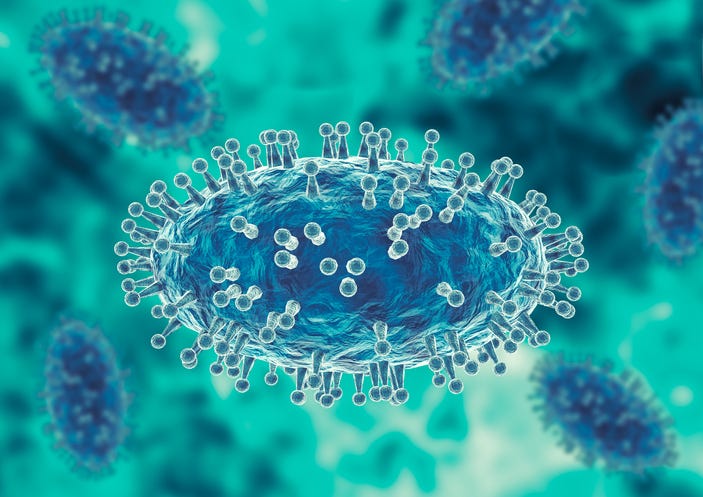
Since mid-May, cases of monkeypox – a rare viral disease that typically occurs near rainforests in Central and West Africa – have been popping up in unexpected places, including the U.K. and the U.S., according to the World Health Organization.
As of Monday, public health officials in the U.K. – where many of the cases have been reported – urged anyone with possible signs of the illness to abstain from sex.
People diagnosed with the disease should “abstain from sex while symptomatic, including the period of early symptom onset, and while lesions are present,” said the UK Health Security Agency. “Whilst there is currently no available evidence of monkeypox in genital excretions, as a precaution, cases are advised to use condoms for [eight] weeks after infection and this guidance will be updated as evidence emerges.”
From May 13 to May 29, the WHO reported 257 monkeypox cases in 23 countries where the virus is not typically endemic, or in regular circulation. Of those, 106 were identified in the U.K.
Portugal had the second highest number of cases at 49, followed by Canada with 26, Spain with 20, the Netherlands with 12 and the U.S. with 10.
According to the WHO, “the vast majority of reported cases so far have no established travel links to an endemic area,” which is atypical for the disease. Since the disease appeared suddenly in several locations, the WHO suspects there may have been undetected transmission of the disease for some time.
Most of the patients who have been diagnosed with monkeypox so far have been men who have sex with men, said the WHO.
Monkeypox was first discovered in colonies of monkeys in the late 1950s, said the U.S. Centers for Disease Control and Prevention. In the 1970s, the first human cases were reported in the Democratic Republic of Congo. Smallpox vaccination – which was routine in the U.S. through the 1970s – may prevent monkeypox infection.
Symptoms of the disease include a fever, headache, muscle aches, swollen lymph nodes and a rash of skin lesions that progresses through several stages before falling off. These stages include: macules, papules, vesicles, pustules and scabs. Patients are usually ill for two to four weeks and the disease can be fatal in 1 to 11% of cases.
Transmission of monkeypox usually occurs by contact with the skin lesions or bodily fluids of contaminated animals or humans.
Respiratory droplets, contact with materials contaminated with the virus or contact with dead humans or animals who had the virus can cause infection.
As of Sunday, the WHO said the overall public health risk for monkeypox at the global level had been assessed as moderate. In the U.S., the overall risk to the general public is assessed as low.
To avoid infection, the CDC recommends that people from the U.S. who travel practice extra precautions. Also, anyone who develops a new, unexplained skin rash should avoid contact with others and seek medical care.
“If possible, call ahead before going to a healthcare facility,” said the CDC. “If you are not able to call ahead, tell a staff member as soon as you arrive that you are concerned about monkeypox.”
The CDC is working with state and local health officials to identify people who may have been in contact with individuals who have tested positive for monkeypox and monitor their health.
In the U.K., health officials are also advising people with possible, probable or confirmed monkeypox to avoid contact with other people until their lesions have healed and the scabs have dried off. Transmission risk may also be reduced by cleaning and disinfection of clothes and bed linens with standard detergents in a washing machine.
“The public health risk could become high if this virus exploits the opportunity to establish itself as a human pathogen and spreads to groups at higher risk of severe disease such as young children and immunosuppressed persons,” warned the WHO.


